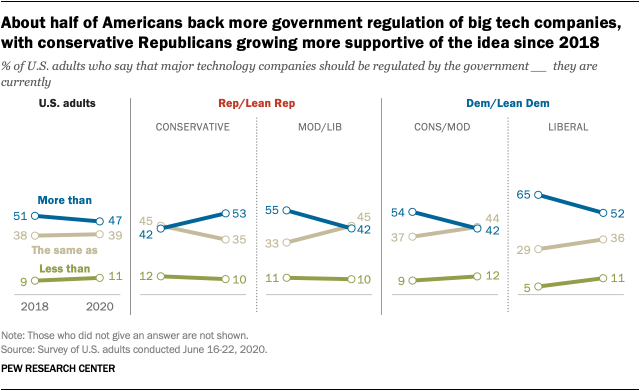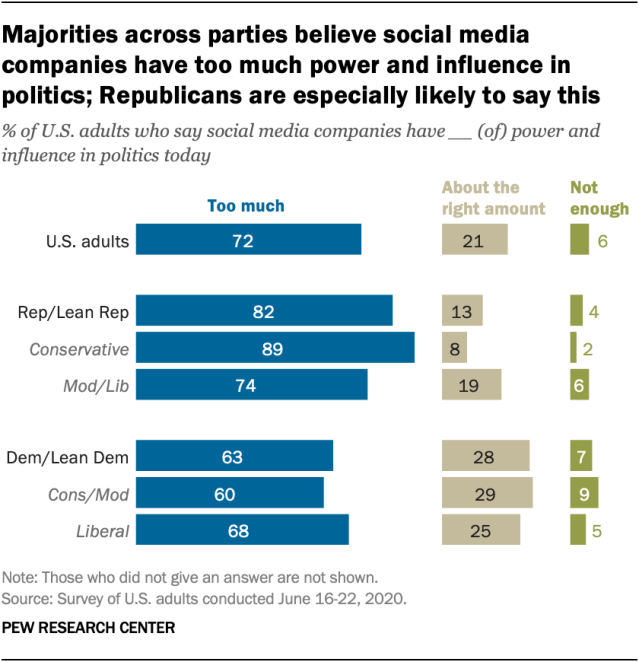A majority of Americans think social media companies have too much power and influence in politics, and roughly half think major technology companies should be regulated more than they are now, according to a new Pew Research Center survey that comes as four major tech executives prepare to testify before Congress about their firms’ role in the economy and society.
Overall, 72% of U.S. adults say social media companies have too much power and influence in politics today, according to the June 16-22 survey. Far fewer Americans believe the amount of political power these companies hold is about the right amount (21%) or not enough (6%).
Majorities of both Republicans and Democrats believe social media companies wield too much power, but Republicans are particularly likely to express this view. Roughly eight-in-ten Republicans and Republican-leaning independents (82%) think these companies have too much power and influence in politics, compared with 63% of Democrats and Democratic leaners. Democrats, on the other hand, are more likely than Republicans to say these companies have about the right amount of power and influence in politics (28% vs. 13%). Small shares in both parties believe these companies do not have enough power.
Pew Research Center conducted this study to understand Americans’ attitudes and views about major technology companies. For this analysis, we surveyed 4,708 U.S. adults from June 16 to June 22, 2020. Everyone who took part is a member of Pew Research Center’s American Trends Panel (ATP), an online survey panel that is recruited through national, random sampling of residential addresses. This way nearly all U.S. adults have a chance of selection. The survey is weighted to be representative of the U.S. adult population by gender, race, ethnicity, partisan affiliation, education and other categories. Read more about the ATP’s methodology.
Here are the questions used for this report, along with responses, and its methodology.
Partisan differences over tech companies also surfaced in a 2018 Center survey, which found that Republicans were more likely than Democrats to believe social media sites censor political viewpoints and that tech companies generally support liberal views over conservative ones.
The new survey also finds ideological differences within the parties. About nine-in-ten conservative Republicans (89%) think these companies have too much power, versus 74% of moderate or liberal Republicans. And liberal Democrats are somewhat more likely than moderate or conservative Democrats to agree with this assessment (68% vs. 60%).
As Silicon Valley has emerged as a powerful hub for tech innovation and a key player in the global market over the past two decades, critics have challenged some companies for what they perceive to be unfair practices. On July 27, the CEOs of Amazon, Apple, Facebook and Google will appear together before Congress for the first time, testifying before the House Judiciary Antitrust Subcommittee as part of its yearlong investigation into competition in the tech industry.
Beyond debates about fair business practices, the tech industry has also come under fire in recent months from a host of critics – from President Donald Trump to civil rights advocates and even tech companies’ own employees.
Amid these concerns, Americans favor more, not less, regulation of major technology companies, according to the Center’s recent survey. Some 47% of the public thinks the government should be regulating major technology companies more than it is now, while just 11% think these companies should be regulated less. About four-in-ten (39%) believe regulation should stay at its current level.

While these overall views of the public are mostly on par with those in 2018, when the Center last asked this question, there have been some notable shifts by party and ideology. Similar shares of Republicans (48%) and Democrats (46%) now agree the government should regulate big technology companies more than is currently the case. This change has mostly been driven by declining Democratic support for increased regulation, which dropped 11 percentage points since 2018. By comparison, Republicans’ views overall on the issue are about the same today as they were two years ago.
Ideology is also a factor. About half of conservative Republicans and liberal Democrats alike are now supportive of more regulation. But this marks another change from 2018. The share of conservative Republicans who believe these companies should face more government regulation has increased from 42% to 53%. At the same time, the share of liberal Democrats who support more regulation of big technology firms has fallen from 65% to 52%. Conservative Republicans are the only ideological group who have become more likely to favor increased regulation.
As was true in 2018, moderate or liberal Republicans and moderate or conservative Democrats tend to hold similar views about regulating the tech industry. Today, 42% in each group say there should be more regulation of major tech companies, down from 55% among moderate or liberal Republicans and 54% among moderate or conservative Democrats in the earlier survey.
Note: Here are the questions used for this report, along with responses, and its methodology.




